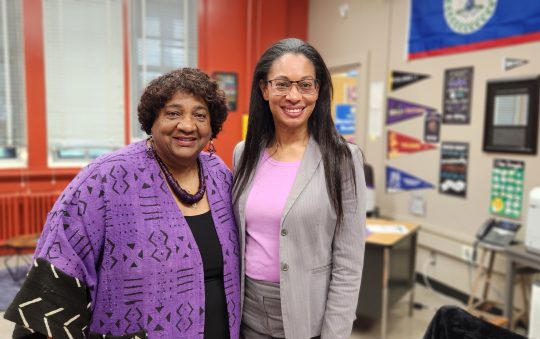The Los Angeles Unified School District Board of Education unanimously approved a new labor contract with the teachers’ union today, despite a warning from the county that the agreement “is not sustainable on an ongoing basis.”
The county Office of Education, which oversees the finances of local school districts, found that the contract with United Teachers Los Angeles “relies heavily on one-time funding sources and projected revenues” and would exhaust the district’s financial reserves below legal requirements within two years.
“The district’s financial analysis indicates it is still unable to meet its reserve requirement in 2020-21 indicating that the agreement is not sustainable on an ongoing basis,” according to the county’s report to the LAUSD board.
“We have communicated our concerns in prior letters regarding the district’s growing structural deficit, and have yet to see the Governing Board implement significant expenditure reductions and/or revenue enhancements that would stabilize the district’s financial position,” according to the county.
“This (contract proposal) continues the district’s practice of allowing the ending fund balance to erode, and continues to move the district toward financial insolvency.”
The report states that school board will be required to submit a “Fiscal Stabilization Plan” by March 18 outlining spending cuts and/or revenue increases that will be undertaken to “fund the ongoing costs” of the agreement. If that plan is deemed insufficient, the county may take steps including “assigning a fiscal adviser with stay and rescind authority over
Governing Board actions.”
The labor contract, which calls for the hiring of more teachers, along with support staff such as nurses, counselors and librarians, has already been ratified by members of United Teachers Los Angeles.
During a teachers’ strike that lasted six days but came to an end with the announcement of the tentative labor agreement, district officials repeatedly insisted that the union’s overall demands could potentially bankrupt the district. UTLA officials disputed that claim, pointing to the district’s estimated $1.8 billion reserve fund and questioning the accuracy of district and county financial projections.
LAUSD Superintendent Austin Beutner acknowledged during the school board meeting that “our budget difficulties are very real,” noting that the district will clearly have to find new sources of revenue.
“This contract is far from perfect,” he said. “Most contracts are.”
Board member Nick Melvoin noted the county’s concerns before the vote.
“It’s up to us collectively to make it (the contract) sustainable,” and to “make the hard decisions internally that his district has neglected,” he said.
After extensive debate, the board also approved a companion resolution — which was called for in the UTLA contract agreement — asking the state to conduct a study of the impact of charter schools on public schools. The motion also calls for an eight- to 10-month moratorium on new charter schools in the district while the study is being conducted.
Expansion of charter schools and co-location of charters on LAUSD campuses was a major point of contention with the union during contract talks, with UTLA contending charters drain students and millions of dollars in state funding away from the district.
The motion, which was approved on a 5-1 vote with Melvoin dissenting, is only a request to the state, which controls charters.
The resolution asks the governor and state education officials to “conduct a comprehensive study to inform future policy considerations for charter authorization reform.”
Board member Richard Vladovic introduced the motion, saying the goal is not to “crush” charter schools, but to examine their impacts after 27 years of operation in the district. He said the moratorium is being proposed “in the spirit of unity to step back — step back after 27 years of an experiment to see if it worked.”
“I do know the original legislation … was never meant to supplant the district, but only supplement the district,” he said. “… I want to step back after 27 years and look at the financial impact, the educational impact. Has it made a difference?”
Members of the advocacy group Reclaim Our Schools L.A. rallied outside the district’s headquarters and attended the meeting with district parents “to hold the board accountable to their promise” to adopt the resolution.
Board member Scott Schmerelson was among those backing the motion, saying the “uncontrolled proliferation” of charters has drained resources from the district.
“How can we oppose better regulating what has been an unconscionable drain” on school funding, he said.
Officials with the California Charter Schools Association also attended the meeting with charter-school parents, calling on the board to reject the resolution, saying a ban “will unfairly target the most vulnerable students in Los Angeles.”
Melvoin spoke against the resolution, saying the district is trying to blame charters for its financial troubles without getting its own financial house in order. He said while he does not believe in unlimited charter-school growth, it would be unreasonable not to give parents a choice if their local public school is failing.
“The best way to mitigate charter growth is to improve district schools,” he said.
Numerous charter-school parents spoke during the board meeting, criticizing the proposed moratorium, accusing the district of lashing out at charters while ignoring problems at failing public school campuses.
“I have the right to have options,” one parent told the board. “I have the right to elect what I think is best for my children. … We deserve to have a better option in our communities.”







